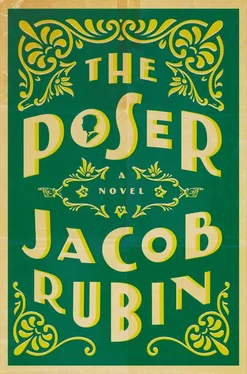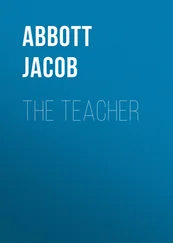I yelped. I tried to grip the wall behind me, but there was no wall to grip. The back of her head bobbed and bore, flashing in and out of the light, hidden by her hair as if under a photographer’s hood. “Yes! Yes! Sure thing! That’s the ticket!” I said it in Max’s voice because I knew I ought to say something, but all I could see was her black hair, that hood, under which she was taking photos of me. “Please stop.” I was yelping. “Stop it, please!”
At these words, her face appeared out of her hair. She looked up at me with pleading eyes, an expression of the wronged or hunted. Later I’d remember it: that vibrating moment when I grabbed her hair. Her eyes pleaded with me in that cold room. In my hands, she unraveled. We were stuck in the rooms of our bodies, but our eyes were keyholes, and as through keyholes, with that freedom, we caught each other.
When it was over, I understood I was naked. I yanked up my underwear and pants. She grinned. “I knew it,” she said, “I knew it,” and sped off, headfirst, around the corridor.
Days later Max confronted me at the Old World, a French restaurant on the edge of Lilac Park. “You tell me right now what’s going on,” he said upon my return from the bathroom. “Either a worm’s jumped into your dick or up your ass, ’cause every five minutes it’s a bathroom adventure.”
Claiming an upset stomach, I had disappeared into the bathroom minutes earlier. There I frowned in the mirror, as she had. I tried her pleading eyes. But my thin, wanting face was all that peered back. It was getting further away from me.
“Out with it.” He said this while (1) chewing with an open mouth, (2) wiping the corner of that mouth with his napkin, and (3) imbuing one of his eyebrows with a giant, bawdy curiosity.
I took a deep breath. “Lucy—”
“I knew it!”
My mouth grew heavy at its hinges.
“All. Tell. Now.”
“She — we had a-a-an encounter.”
His mouth hung open. “On my mother’s expensive grave, Giovanni, do you mean sex ?” The last word hissed out of him with a sibilance that snaked up my spine, up the waitresses’ loose black aprons and around the jabbering eaters, as if a director somewhere had yelled “Action!” and all things obeyed. “Tell me a fucking tale.”
I did, wincing when certain words and certain things for which there are no words (the hurt in Lucy’s eyes, the rumbling in my head) required description. The entire time he listened visibly, and if it had been any face other than Max’s at the end of the table, my tongue would have wilted. When I stumbled or blushed, he filled in for me, planting hard terms in the holes of my speech. He yanked the story out of me and tackled it to the ground.
It was my first time kissing and telling, and I learned what every man learns the first time he tells: that the narrating of an experience like that is no repetition, no rehashing of that wet, combustive moment but that moment’s midwife, what pushes it out into the noisy world, births it, and in that way forever separates you and the unspeakable seed of what was or might’ve been. As Max pulled the wheres and whats out of me, like a detective, I waved goodbye to the impossible reality of Lucy.
“In-motherfucking-deed,” Max said when the tale had been patted down to his satisfaction. He leaned back in his chair, shaped an ostentatious O with his mouth, and breathed heavily. If there had been smoke in his lungs, rings would have drifted between us. “And so what — you’re in the bathroom tugging it, I bet? Tugging it like a fiend, eh?”
To my relief, he didn’t seem to recall my drunken confession backstage, my admission the night of our premiere that I couldn’t do her. I nodded, not wanting to say more.
“It’s tough, boy. You get that taste and you want it again. There’s a lot of talk of penis envy. Lord knows I’ve contributed to it, but there’s the opposite, too. We envy what they have. That slit. Yes, boy, yes, there’s far too little mention of absence- envy.” He continued to ruminate at a high volume. Already I regretted saying anything. It was always that way, as if the punishment for sharing were being heard.
We paid the check and walked west toward the train station just as the sun was going down, in the human silence sunsets enforce. As I learned, it was best to be aboveground for sunsets. Otherwise, you entered the subway in the day and emerged from it at night, feeling stranded. We were turning onto Eighth Ave when Max started. “My God.”
It had been painted on the side of the Eighth Avenue Church: a face, or the blueprint for one. An oval with two circles for eyes, a triangle for a nose, circle for a mouth. Underneath was written G. BERNINI. Like an animal it appeared both enlightened and permanently bewildered, the eyes and mouth the same size. I wanted Mama to come down there and peel it off the wall. But it was writing, and writing cannot be peeled.
“Any publicity is good publicity. That’s what I say,” Max tried.
I must’ve looked how I was feeling, since Max put his arm over my shoulder. “It’s the beauty of the act,” he said as we walked up Eighth Avenue. “Everyone wants to be you, because you’re being them.”
• • •
That Saturday, ten new strangers. A haberdasher who cupped his left elbow in his right hand, shyly. Giggling sisters. A cop.
Who knew the City’s jaded public hungered for an art as basic as imitation? In our first ten performances we would meet with sold-out crowds, a sea of heads who each Saturday carted a tense breed of silence into the Communiqué and left it with crackling pleasure, like teens bounding out of a dance hall. Those who wished to be imitated would soon call in advance or arrive at the ticket window days before the performance to receive their “stage number,” an option so many chose that our list of volunteers soon stretched comfortably into April. Bernard, eager to extend this success and masterful at garnering attention, would purchase a weekly ad in both the Gazette and Daily Scribe , even billboard space over the shipping docks, featuring in bold red letters THE EVERYMAN and under it, quotes from critics who’d discovered me as an object of hyperbole.
In time, Max would inject new quirks into the act. In one of our more popular twists we’d call family groups to the stage — a husband and wife, say, or mother and daughter. Stage right we would stand a wardrobe screen behind which Max would lead me and one member of the pair. So hidden, we — the towheaded child and I — would take turns saying, “But I hate peanut butter!” and that separated mother, or wife, stranded stage left, would then venture a sometimes exultant, sometimes quavering, guess as to which of those voices belonged to her intimate and which to the famous impostor, Giovanni Bernini. The entertainment, of course, lay in how often they were wrong. A mother mistook me for her son. A man knew my voice was his wife’s, at which point I would appear from behind the screen saying, “It’s me , honey!” provoking the sincerest hurrahs from the audience.
In fact, from the crowd’s reaction one would have thought I’d created a child from behind that screen. Not to speak of the volunteers themselves who, seeing me emerge, who a moment ago knew that I was their wife or daughter — these volunteers, upon recognizing their error, would hug me or even jump up and down, ecstatic, really, as if I had introduced them to their own flesh, as if inside the most familiar people (their wives and husbands) and inside themselves, too, lived a stranger they might never know, or the space for such a stranger, a prospect that thrilled them.
Читать дальше












